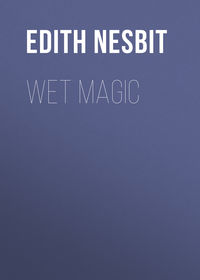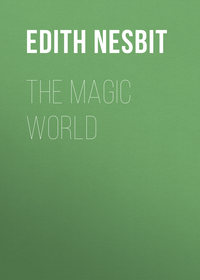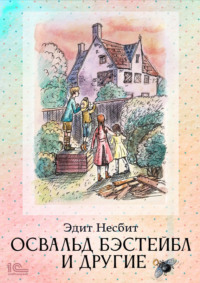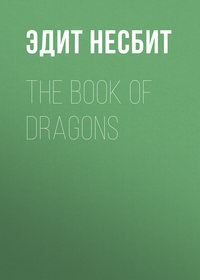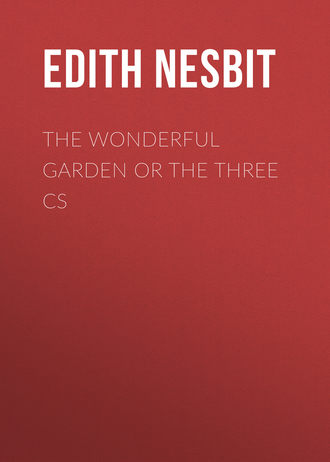 полная версия
полная версияThe Wonderful Garden or The Three Cs
‘Let’s go and have another look at those birds’-nests while we’re waiting,’ said Charlotte, with great presence of mind. And so it was through the little diamond panes of the lodge that they saw again the Murdstone gentleman, in evening dress and an overcoat, with his tie in a crumpled state under one ear, and his face, as Charlotte said, exactly like the face of a baffled executioner.
He stood talking to the Police for a few moments, with the old familiar scowl that they knew so well. They felt like that about it, though they’d only met the scowler, as you know, on one occasion. Then he went back through the gate, and the children, when they were quite sure that he was gone, rejoined the Police, rather tired, and feeling as though this silly game of looking for what they knew, or at any rate hoped, they weren’t going to find, had been going on for ever, and seemed as though it would never stop.
‘I thought it best,’ the Police explained to William, ‘to keep the gent on the outside of the place. He seems peppery-natured, and if he was to spy his boy among your glass-houses, which is where I propose to conduct my search in next, I wouldn’t answer for it but what he’d leap upon him among the glass like a fox at a duck, and damage untold, as like as not.’
Need I tell you that Rupert was not discovered among the glass?
Less brisk than at its starting, the search-party returned to the side door where the coloured glass was, to be met on its doorstep by Caroline, rather out of breath and very hot. She carried her sun-bonnet by its strings (Aunt Emmeline believed in sun-bonnets and made dozens of them, as presents for all her friends).
‘Well?’ said Caroline.
‘We haven’t found him, Miss, if that’s what you mean,’ said the Police, taking his helmet off and wiping his face. ‘I suppose you ain’t seen anything?’
Caroline looked nervously at the others.
‘I heard something,’ she said, ‘in the wood over there. I went back,’ she went on in a sort of wooden way – and now she was not looking at the others at all – ‘because I left something there; and I heard a rustling sound, and I saw footmarks, in the boggy part of the wood, and I thought it looked like boy’s boots.’
Charlotte said afterwards that she really thought she should have burst into little pieces. And Charles said the same.
To hear their own elder, and till now loved and esteemed sister, quietly betraying the refugee, and to be quite unable to say what they thought of her without having to explain the lack of candour in their own conduct! It was a terrible moment.
‘You don’t say so,’ said the Police, and turned to William. ‘It’s a thirsty job,’ he added carelessly, and William said he’d ask indoors.
A tray with glasses and a jug of something cool resulted. And the Police and William both seemed the better for it. The gardener had retired. It was too far the wrong side of dinner-time for him, he said.
The Police drew a long breath, and wiped his mouth with the back of his hand.
‘Now then,’ he said; ‘you lead the way, Miss.’
Caroline led. The others followed. They could hardly bear to go, yet they could still less bear to be left behind. Across the hot sunny grass they went and into the wood. Even that, though shady, was hot, and there seemed to be more flies than could possibly be needed for any useful purpose. Caroline, still carefully avoiding the eyes of the others, led the way straight to the ferny lair where they had left Rupert, the others following in helpless fury.
‘Hullo!’ said the Police, ‘this looks something like.’
For there the lair was – plainly to be seen – a lair and nothing else, but a lair that was deserted.
‘I think we’re on to him now,’ said the Police; ‘which way did you say them footstepses was, Missie?’
‘Farther on,’ said Caroline. ‘I tied my handkerchief to a tree to mark the place.’
‘You never!’ said the Police admiringly; ‘why, you deserve to be in the Force, Miss. It’s not every constable, even, would have thought of that.’
And I believe he spoke the truth.
Following Caroline and the Police, pushing miserably through the bushes that sprang back as the others passed through and tried to hit them in the face, Charlotte and Charles exchanged glances full of meaning.
The whole party made a good deal of noise: there was the rustling of leaves, both the green and the dead kind; the snapping of twigs underfoot; the grating of bough against bough as the searchers pushed through the hazels and sweet chestnuts and young oaks.
‘You’d do fine for keepers,’ said William, coming last. ‘No poachers wouldn’t never hear you a-coming.’
‘That your handkerchief, Miss?’ the Police at the same moment asked smartly, and pointed to a white thing that drooped from a dog-wood branch; ‘you identify the handkerchief?’
‘Yes,’ said Caroline in a stifled voice, ‘and there’ – she pointed down.
There were footprints, very plain and deeply-marked footprints, not very large, yet not small like a girl’s. They were the footprints, beyond any doubt, of a boy.
‘Now we’ve got him,’ said the Police for about the fifteenth time that morning, and proceeded to follow the steps, as was remarked later, like any old sleuth-hound.
William said, ‘Remarkable deep for the time of year,’ but nobody took any notice of him. The boot-boy took a pleasure in planting his own steps beside the tracks they were following, till the Police admonished him.
‘Them tracks is evidence,’ he said; ‘you needn’t tread so nigh them.’
The tracks led them down a steep place, a sort of gorge, and ended at the tall oak fence.
‘He must have escaped this way,’ said the Police.
‘I’ll take my Sunday Sam he never,’ said William.
‘There’s another footprint here,’ said Caroline anxiously.
‘So there be,’ said the Police. ‘You ’ave been a ’elp, Miss. I shall name you in my report.’
It was now seen that a further line of footprints led along the fence to a place where a pale was loose.
‘This is where he got through, you may depend,’ said the Police.
‘I’ll easy wrench another pale loose, if you want to follow on,’ said William, and as he did so Charlotte saw him wink, distinctly wink at Caroline. How hateful everybody was! Oh, poor Rupert!
Every one got through, Charles and Charlotte rather doubtfully looking up and down the road first to see if the Murdstone master was in sight. ‘Which way?’ the Police now asked himself and the others anxiously.
That was quickly settled. A whitish object lying in the middle of the road ten yards away, beckoned them to the right. The Police stooped stiffly, picked it up and examined its corners.
‘Rupert Wix,’ he read solemnly. ‘I shall now sound my whistle and acquaint the gentleman as owns the boy with our discovery of the ankercher belonging to the runaway.’
But Caroline laid a hand on his arm and arrested the whistle on its way to his lips.
‘Isn’t that something else white, farther along?’ she said.
‘Don’t tell me ’e got two ankerchers,’ said William; ‘no boy was ever bred as ’ad two ankerchers at the one time.’
‘I don’t see nothing,’ said the Police, but he walked in the direction of Caroline’s gaze.
‘It’s wonderful what eyes you’ve a-got, Miss,’ said William; ‘none of the rest of us didn’t spy it.’
Charlotte and Charles walked apart from Caroline in a marked manner.
There certainly was something white in the road – a piece of paper with a stone on it, and also, as the Police saw when he picked it up, writing, pencilled, with that kind of black blunt pencilledness which happens when you have a pencil whose point has seen better days, and you encourage its efforts with your tongue.
‘To any kind Bypasser,’ the Police read out, ‘please put the inside in the post for me.’
The paper on which this was written was a leaf torn from a note-book and folded across. Inside was another leaf with a stamp in the corner, as though it had been a post-card. On one side was an address, ‘Mr. and Mrs. Wix, The Nest, Simla, India,’ and on the other these lines which the Police read out:
Dear Parents – I am running away to sea through being so ill-treated by Macpherson. I will write from the first port. I shall get a ship at Hastings, I expect. – Your affecate son,
Rupert.‘Well!’ said the Police; ‘if that don’t beat all! Lucky we saw this.’
‘Yes, ain’t it,’ said William, ‘and this the Hastings road and all. You ought to catch up easy if you start right away now.’
‘I shall now blow my whistle,’ said the Police as usual, ‘and acquaint the boy’s guardian with our discovery.’
‘If we can’t be any more use,’ said Caroline hastily, ‘perhaps you wouldn’t mind our going back to our dinners. They’ll be getting dreadfully cold for the time of year,’ she added a little wildly.
‘Best go back through the gap,’ said William. ‘It ought to be mended, though. Here, you,’ he said to the gardener’s boy, ‘go round by the lodge and tell Peters to get it seen to.’
‘There is no need to detain you,’ said the Police, ‘and thanking you for your assistance, which shall be mentioned in my report. Good morning to you.’ He blew his whistle and they hastened back through the gap.
Once through it the others refused to meet Caroline’s eye. But she did not seem to notice it.
‘I know listening’s wrong,’ she said; ‘but when you’re playing detectives the rules are different, and I should like – ’
‘Slip along by the pale, Miss,’ said William. ‘“All’s fair in love an’ war,” as the saying is.’
She slipped, and the others could not help following her. William went too.
The boots of the Murdstone tutor were now heard on the road. Then came the voice of the Police, explaining how clever he had been in finding the footsteps, the handkerchief, and the letter. ‘And you’d best read the letter,’ the Police added.
A brief letter-reading silence was broken by the Murdstone man, very angry indeed.
‘Monstrous!’ he said; ‘and left in the public road for any stranger to see! Monstrous! There’s not a word of truth in it.’
‘You can tell that to the Magistrate,’ said the Police. ‘Beg pardon, sir, I mean I think I’ve cleared up this little difficulty for you.’
‘I suppose I can get a trap in the village?’ the Murdstone man asked.
‘At the Green Dragon, sir.’
‘Right,’ said Mr. Macpherson smartly. ‘Good morning!’ And he turned and walked quickly away, leaving the Police planted there, as they say in France.
‘Well – I’m – dished!’ said the Police aloud, after a moment’s silence, to what he supposed to be solitude; ‘not so much as tuppence to drink his blooming bad health in. The stingy blighter! He can look for his own boys after this. And I hope the young ’un gets off, so I do.’
‘Same here,’ whispered William behind the grey oak paling.
The Police walked heavily away.
‘Best go in to dinner,’ said William, and the four walked in silence across the park. When they got to the side door William spoke.
‘You’re a fair masterpiece, Miss Caroline,’ he said; ‘that I will say.’
‘Thank you,’ said Caroline.
Charles and Charlotte both felt – they owned it afterwards – almost choked by all the things they wanted to say to Caroline and couldn’t, because of William. They drew long breaths and almost snorted with mixed emotions.
‘I say,’ said Caroline eagerly, as William turned away. But Charles interrupted.
‘We don’t mean to speak to you,’ he said.
And just then Mrs. Wilmington appeared at the door, and no one could say anything further; anything that mattered, that is.
She escorted the girls to their room. In her superior lady-like way she was curious about the missing boy. Charlotte told the story briefly, while Caroline buried her hot face in a big basin of cold water and blew like a grampus. Then there was dinner, and Mrs. Wilmington stayed all through that to hear more details. When dinner was over Caroline disappeared.
‘I expect she’s gone away to cry,’ Charlotte whispered to her brother. ‘I say, I wish we hadn’t. But we did agree we oughtn’t to speak to a traitor till it was sorry: you said so yourself in the wood.’
‘It’s all very beastly,’ said Charles. ‘I wish it hadn’t happened, upsetting everything.’
‘I say,’ Charlotte said, ‘let’s forgive her now. I expect she thought she was doing right, being like a Spartan boy or something. Caro is silly like that sometimes. Let’s go and find her and forgive her, and talk it all over comfortably, the three of us.’
‘I don’t mind,’ said Charles; ‘let’s find her, if you like.’
But they couldn’t find her.
CHAPTER VIII
THE HEROINE
It was William who, when they had searched house and garden and park for nearly an hour, greeted the two as they trailed forlornly into the stable-yard on the last wild chance of finding her there. By this time both were thoroughly sorry and remorseful, and very anxious indeed to know what had become of their sister.
‘I suppose you haven’t seen Caroline anywhere about?’ they said to William, who was sitting in the harness-room door, with a rose in his button-hole, smoking a black clay pipe.
‘She was out in the garden a bit back,’ he said; ‘give me this ’ere button-hole. She’s a sister to be proud on, she is.’
‘Why?’ asked Charles blankly.
‘What she done this morning,’ William answered.
‘I suppose she thought it was right.’
‘I don’ know about right,’ said William, scratching his ear. ‘Anyhow she went down along towards where you was messing about in the wood this morning. Just after dinner she went with a book under her arm and her pinny full of roses. I’m coming along that way myself when I’ve finished my pipe.’
Charlotte and Charles went down slowly to the wood, and they were both very uncomfortable. However right Caroline might have been…
‘I can’t understand how she can– the very place where he was – all safe only this morning,’ said Charlotte, and walked slower than ever. They went so slowly that William had almost caught them up before they had reached the wood.
Just before they turned in among the dappled shadows of the wood, Charles said, ‘Did you hear that?’
‘Yes,’ said Charlotte; ‘it’s only Caro talking to herself.’ And they went on. They did not hear any more talking, and when they reached the lair Caroline was sitting there silent with a splash of red rose colour beside her among the fern.
‘Oh, Caro!’ cried Charlotte, almost weeping and flumping down beside her sister; ‘I’m sorry we were horrid. We see now you must have thought you were being Spartan-boyish or something. And it’s too perfectly horrid. And do let’s make it up; do.’
‘I did think you’d more sense,’ said Caroline, but she kissed Charlotte too, ‘or that you’d know that I had – more sense, I mean. And directly I began to tell you, you said That.’ She sniffed. It was plain that she had been crying.
Charles sat down. ‘I’m sorry too,’ he said handsomely. ‘Now let’s talk about something else. Our only hope is to forget poor Rupert.’
‘I’ll try to forget him,’ Charlotte said; ‘but he was such a nice boy. I suppose you had to do it, Caro. But, oh, I do wish he was back again.’
Here Charlotte began to cry.
‘Oh, don’t!’ said Caroline, putting her arm round her; ‘do you mean to say you don’t understand yet? I’d no idea you could be so silly.’
‘I don’t think she’s silly at all,’ said Charles loyally. ‘I wish he was here too.’
‘He is here,’ said Caroline in an exasperated whisper; ‘just behind you. We thought you might be some one else, so he hid. Come back, Rupert; it’s only them.’
And from the tangled thicket Rupert put forth a head very rough as to the hair, which bristled with twigs and pine-needles.
‘Then you didn’t run away to sea?’
‘Not much,’ Rupert answered, leaning on his elbows and showing only the head and shoulders part of him.
‘But the letter said – ’
‘That was her,’ Rupert explained, pointing at Caroline with his head. (That looks odd when you read it, but if you try, you will find that it is quite easy to do.) ‘That was her. It was all her. I’ll never say anything about girls being muffs again. She absolutely ran the show. She’s a brick.’
‘Oh, shut up,’ said Caroline with hot ears.
‘But what did she do?’
‘Took them off the scent. Tell them all about it,’ said Rupert.
‘No, you,’ said Caroline, rolling over and burrowing her nose among the roses.
‘Well, it was like this. After you’d gone off, I was in a blue funk, and I don’t mind owning it. And when she came back I thought it was the Police, and about all being lost except honour – and precious little of that. Then she explained it all to me, and I got my boots off.’
‘Explained what?’ Charles had to ask.
‘Her plan, you duffer; her glorious Sherlock-Holmes plan.’
‘You might have told us,’ Charlotte couldn’t help saying.
‘How could I? All among William and the Police?’
‘Well, go on.’
‘She’d got her pocket-book, and I wrote that letter. She thought of that too. And I gave her my hankey, and she carried my boots off in her hand, and when she got to the swampy place she put them on and made the footmarks.’
‘I stamped them in as deep as I could,’ Caroline broke in, ‘and I found the fence and got out and put the letter, and simply tore back round by the lodge. Didn’t you notice how hot I was? I saw the Murdstone man, but I’d got my sun-bonnet. He was cutting the heads off nettles with his stick like some one in the French Revolution.’
‘And she led them off the scent completely. They’d have been certain to find me here, with the fern all trampled about. She thought of that too,’ Rupert said.
‘But where were you then?’
‘Up that tree.’ He pointed to a leafy beech. ‘I saw you all go by, your Police with his nose on the ground like any old hound. Not one of you looked up. She’s a regular A1, first-class brick, if you ask me. And now if you can hide me a bit here till I’ve written to my people and got an answer – Yes, she is a brick. And I shall always stand up for it that bricks are bricks even if they’re only girls.’
‘You do make such a fuss,’ said Caroline, delighted with his praise and trying not to be, and feeling it the duty of a modest heroine to turn the subject. ‘And now I thought we’d be the Royal Order of the Secret Rose. The rose is the emblem of secrecy. Two buds and a full-blowner you have to wear. It’s the badge.’
She chose flowers and buds from the crimson heap and presented them to the others. The needed pins she produced from the front of her pinafore.
‘I’ve got one too,’ said Rupert, grinning from his covert. ‘A badge, I mean, and – ’
‘Hush!’ whispered Charlotte; ‘there’s some one coming. It’s William!’
‘Oh, that’s all right,’ Caroline said amazingly. ‘William knows. He’s one of us. He’s wearing the Royal Rose too.’
‘And he isn’t going to tell?’ Charles could hardly believe it of a grown-up.
‘No, he ain’t a-going to tell’; it was William who answered, pushing through the leaves and sitting down squarely on a stump. ‘I don’t give away a good sport like what Miss Caroline is – not me.’
‘But when did you find out?’ Charlotte asked.
‘I had my suspicions from the first – Miss Caroline going off so artful. And then when she come back, of course I knew.’
‘Why “of course”?’ Charles wanted to know.
‘Well, nobody except the Pleece would cotton to it as a young lady like Miss Caroline would set out to give away a runaway dog as ’ad trusted her, let alone a young gentleman.’
Charlotte and Charles never wish to feel less pleased with themselves than they did then.
‘An’ the bootmarks,’ William went on; ‘much too deep and plain they was for anybody as was out to get off, with somebody arter them. Let alone as I see a bit of young master’s jacket up in the tree as we come over the park. And the ankercher dropped so handy. Not but what I own I thought it was all up when we come to that letter. I did think that was a bit too thick. As if people on the bolt ’ud stop to write letters and lay them convenient like in the middles of roads. I thought you’d killed the cat with kindness that time. But no – ’e swallowed it all, old Poad did, like mother’s milk it went down. And so did the schoolmaster. And off ’e goes. And off he goes. And off you goes to your dinners, and I come along to the young chap in the tree and fetches him a bite of something, and whistles him down that all’s serene. And Miss Caroline she comes along and makes me a member of her ancient order of Rosy Buffaloes, or whatever it is, and here we are as jolly as you please, and safe as you please. Only my advice is, tell the Master.’
‘We can’t,’ said Caroline earnestly. ‘It wouldn’t be fair. He might think it was his duty, or something – ’
‘Ah!’ said Charles, relieved; ‘we’re not the only ones. We thought that of you. It’s just the same.’
‘There’s only one difference,’ said Caroline – and this was the only time she hit back that day, so we may forgive her for it – ‘one difference, and that is that I’m right and you were wrong.’
‘Oh!’ said Charles blankly.
‘Best tell the Master.’ William’s tone was persuasive.
‘You said you were ours to the death.’
‘You asked me if I was, and I wasn’t going to contradict a lady,’ William corrected. ‘And as far as keeping my tongue betwixt my teeth, and lending a hand in the victualling depart: and a rug and a truss in the straw-loft that I’ve got the key of, and where the Master hisself wouldn’t presume to show a nose – as far as that goes, I’m your man. More especially since I seen your governors, teachers, pastors, and masters in that nasty white rage with his face all twisted. I wouldn’t ‘and over a blind kitten to ’is tender mercies. But my advice is – ’
‘Don’t!’ Caroline implored; ‘because really we can’t, you know.’
‘Well, I must be getting along,’ said William, rising stiffly; ‘I ain’t talked so much since the election. And I wasn’t a-going to say what you thought I was a-going to say. What I was a-going to say was, get out of this. It’s all trampled, and some one’s sure to notice – if it’s only that Jim. You go deeper into the wood, and come night-time I’ll fetch him away and bed him down all right. So long!’
He tramped away, crunching sticks and stalks as he went.
‘How glorious,’ Charlotte said slowly, ‘to have a real live heroine for your sister.’
‘Yes, but,’ Charles asked anxiously, ‘are you sure William will keep the secret?’
‘I’d answer for him with my life,’ said Rupert. ‘You don’t know how jolly he was when he brought me the bread and cheese, and water in a medicine bottle. It tasted a little of camphor. Awfully decent chap he is!’
‘He can’t help keeping the secret,’ Caroline spoke with impressive earnestness; ‘he wears the Royal Rose and the twin buds, the badge of secrecy. If you wear that you simply can’t betray a secret. It says so in the Language Of, page 37.’
She picked up the book from under the roses, fluttered its leaves, found page 37 and read:
‘“The red or damask rose, full-blown and worn with two of its own buds, is the emblem and pledge of inviolet” – inviolable, I mean – “secrecy, and he who wears the Royal Queen of flowers accompanied by two unopened promises of her future magnificence, by this eloquent symbol binds himself to preserve uncontaminated the secret trust reposed in him by the more delicate and fragile portion – fragile and delicate as the lovely flower which is the subject of our remarks – of the human race.”’
‘I see,’ said Charlotte, relieved; ‘then he can’t tell, even if he wants to.’
‘If the book knows,’ Charles added.
‘Well, it’s all right, you know,’ said Rupert, ‘because I’m a judge of human nature, and I know that William is the soul of honour, and wouldn’t want to tell even if he could.’
‘So that’s all right.’ Charlotte breathed deeply. ‘I say, Rupert, aren’t you afraid?’
‘What of?’
‘The Police.’
Rupert laughed. ‘I think William was right,’ he said, wriggling out a little farther from the fern so that the red rose in his button-hole burst suddenly upon public view; ‘if the Police would swallow that letter they’d swallow anything. And if the eyes of the whole vox populi were upon me,’ he ended with a grand if vague remembrance of old Mug’s careful teaching, ‘Caroline would find a via media, or way out.’
‘Rats!’ said Caroline briefly.


